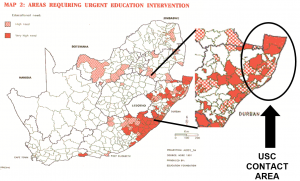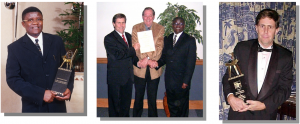About The Science Centre
A Walk Down Memory Lane
The University of Zululand’s Physics Department applied to the University authorities for permission to open a Science Centre in the faculty of Science, at the end of 1982. Permission was granted and work begun early in 1983, with a donation from Old Mutual. The Centre was housed in an old laboratory on the top floor of the Zoology building. Prof. Johan van der Merwe of the Physics Department, with the assistance of other staff, ordered and built equipment for the Centre, which was opened on the 6th of November 1986. The Centre has been open continuously for the 32 years since then and was visited by about 3000 students annually whilst at the University. It comprised some 130 interactive exhibits .
At the end of 1991 the head of the Physics Department applied to the Foundation for Research Development (now the NRF) for funding for a staff member for the Centre. This was granted, and from October 1992 to mid 1997, the Centre was run by the Physics Department and sponsored by the FRD. Since late 1997, the Centre has been run by the University (covering key salaries) as its flagship outreach programme, with inputs from various other donors. As well as hosting visitors to the Centre, the project runs a number of outreach activities (detailed later in this document), many in cooperation with local (Richards Bay) industries.
In November 1995, USC was offered the use of a 1000 square metre industrial building in Alton, Richards Bay. Funds were raised from local industries for necessary renovations which took place from July 1996 to February 1997. The Science Centre, with all its exhibits, was moved to the new facility, and opened on the 27th of February 1997. The new facility has allowed for expansions in the programme, visitors and staff, being visited by over 30 000 learners annually. There have been three expansions to this facility since then. In November 2004, a new 600 square metre building was opened, funded by the Department of Science and Technology.
This provided 400 square metres of new exhibit space and a multi purpose classroom. In November 2006, a further extension comprising a 200-seater auditorium and TRAC-Lab was opened, with funding from BHP Billiton (building) and Murray and Roberts (TRAC-Lab). In September 2011, a further 600 square metre building was added (sponsored by BHP Billiton) as an early childhood development centre – the first dedicated children’s museum in Africa. Present staff consists of a Director, an Operations Manager, and four Team Leaders, in addition to various other facilitators. Since 2008, the Centre has enjoyed the assistance of interns placed and funded by the Department of Science and Technology.
UNIZULU Science Centre is aimed at Science educators and learners in KwaZulu-Natal schools surrounding the University of Zululand. The focal area stretches roughly from the Tugela River in the South to Kosi Bay in the North, and inland as far as Nongoma. It includes roughly a quarter of KZN’s education districts (King Cetshwayo, uMkhanyakude and Zululand) which contain about 550 secondary schools. The vast majority of these schools (535) fell under the previous Department of Education and Culture (KwaZulu) with the remaining 15 (3 %) being model C or private schools. Education departments in KwaZulu-Natal were amalgamated in 1995, but historical inequalities in terms of facilities and educators have not changed substantially.
Education in Northern KwaZulu-Natal generally is in a critical condition, and Science education is no exception, with under-qualified educators, little or no equipment and many schools not even electrified or supplied with water. The region has also received very little outside assistance in the past, being fairly distant from any large centre.
The educational regions covered have been identified in many surveys and studies as the most disadvantaged in the province (and amongst the most disadvantaged nationally!)
From the original RDP document in 1994, numerous reports both national and international have confirmed the critical state of SA’s education system – especially in science and mathematics (like the TIMSS and PIRLS reports, Annual National Assessment or ANA, World Economic Form’s Global Competitiveness Report etc).
USC addresses these critical problems on two fronts, by:
- Stimulating an interest in Science amongst school learners.
- Assisting learners (especially matriculants) and educators with the Science syllabus and with examinations.
- And thereby: Channeling Science learners into technological careers, especially through studies at the University of Zululand.
* Science Centre: The Science Centre (Exploratorium) forms the base for all activities with more than 200 interactive experiments on display for visiting school-learners, in addition to a 200 seater, state-of-the-art auditorium. Most of the learners in our contact area have no access to scientific equipment, and gain at best a theoretical knowledge of the subject. The Science Centre seeks to provide a “hands-on” experience of Science for these learners. The Science Centre is visited by up to 30 000 learners each year, mostly from severely disadvantaged, rural schools. Visitors enjoy a science show, science workshop, time with exhibits and a visit to the adjacent career guidance centre.
* Planetarium: USC has an inflatable planetarium – in which up to 60 learners can enjoy a perfectly accurate depiction of the night skies. Various programmes revolve around this, involving sundials, telescopes and optics.
* ECD Centre: USC has a dedicated Early Childhood Development Centre opened in 2011 with funding from BHP Billiton and a donation of exhibits from Graz in Austria. It is the only dedicated children’s museum on the continent of Africa.
* Mobile exhibits: The Unizulu Science Centre has pioneered the Australian “Science on the Move” programme in South Africa, setting up mobile exhibits in rural schools and taking shows and educator workshops out of the Centre. These mobile exhibits (which were developed in-house) have toured several schools.
* Special Events and Festivals: Regular special events and focus weeks (like National Science Week in August) are held each year to maximise media coverage and impact on the surrounding communities. Since 2015, Zulfest, the Zululand Science Festival, has been held in May each year, attracting the best of local and international presenters to USC.
* Educator Enrichment Courses: Many three-day and one-day courses are run for Science educators annually to consolidate and broaden their skills, in conjunction with the Centre for the Advancement of Science and Mathematics Education (CASME). These courses provide vital in-service training for educators in Science, Mathematics and Biology. USC has also provided science and maths teacher training in 4 educational districts for the Department of Education.
* Resource Centre : A resource centre of equipment, audiovisual aids and reading matter has been set up in the new Richards Bay Centre (run by CASME) to allow educators access to these vital teaching-aids.
* Competitions : are run for learners to generate enthusiasm for the subject. These have included Bridge Building, Water Competition, Eskom Expo for Young Scientists, Astronomy Quizzes and Essay Competitions.
* Matric Workshops : Science Workshops focusing on skills in preparation for the final exams are presented twice a year to over 5000 matric students at 11 rural venues. In 2020, owing to the COVID Lockdown, a series of videos (Essential Skills for Matric Science) was made so that these workshops could be accessed virtually:- over the internet or from memory sticks.
The USC functions as an outreach programme of the University of Zululand, and falls under its governance structures (financial and HR) as part of the Faculty of Science. The University’s Physics Department, who initiated the project, plays an active and supportive role. All aspects of the programme are organized with local Science educators to ensure that the relevant needs are met.
There is a high degree of cooperation with the local Department of Education offices, especially with the Science Advisors. The National Department of Science and Innovation has recognized the work of the Unizulu Science Centre, and made some funding available for expansion and for various DSI activities.
Networking with other groups is actively pursued to make the most of available resources. Local industries have been extremely supportive both financially and in using their expertise to assist us and to enrich educators, and new partners are being sought all the time. A number of international colleagues spend time at the Centre each year to share expertise.
UNIZULU Science Centre has been acclaimed locally, nationally and internationally, winning numerous awards in the field of Science Education. The Unizulu Science Centre won the 2001 National Science and Technology Forum (NSTF) award for the most outstanding contribution to Science and Technology by a non-profit organisation.
Derek Fish, the Centre Director, won the 1999 NSTF award for best individual contribution and was a finalist in the 2010, 2011 and 2015 awards for Best Science Communicator. Derek has also won the S.A. Institute of Physics Silver Jubilee Medal for his work in USC, as well as being placed in the Katlego awards for NGO leadership. USC staff has served on the Southern African Association of Science and Technology Centres (SAASTEC) council since it was formed and Derek and Alfred Tsipa are past Presidents and members of the International Programme Committee which coordinates Science Centre World Congresses, helping to organize the 2002, 2008, 2014 and 2017 World Congresses, and securing the 2011 Congress for South Africa.
Derek represents Africa on the Global Committee of ASTC. Derek has repeatedly won Best Science Demonstration Competitions at Physics and Science Centre conferences in South Africa, as well as in the UK. The Science Centre won 3 separate business awards at the end of 2004. Unizulu Science Centre has hosted 4 of the 18 SAASTEC Conferences, as well as the UNESCO International SC Day each year (10 November)
For more information, please contact the UNIZULU SCIENCE CENTRE:
Postal Address:
UNIZULU SCIENCE CENTRE,
P.Bag X1001
KwaDlangezwa, 3886,
(South Africa)
Physical Address of Science Centre:
(Google “Unizulu Science Centre”)
Unizulu Science Centre, Gate 1, ZCB Community Park, South Central Arterial, Alton, Richards Bay.


